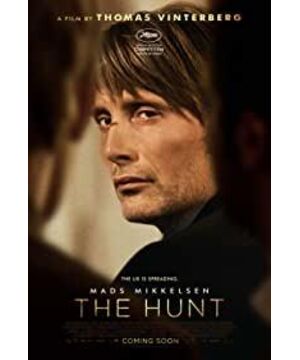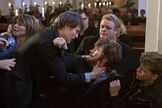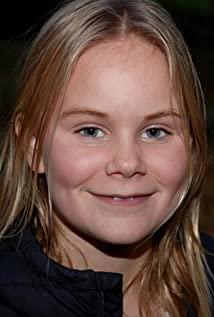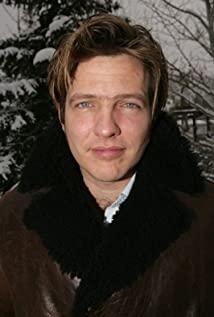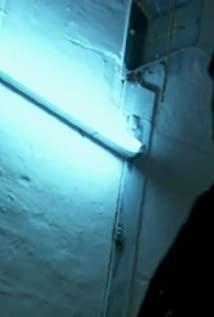The tone is relatively depressing, and the calm and realistic photography style also reflects this. The plot advances in a slow rhythm and there is almost no soundtrack. It only relies on the director’s strategizing lens language and the wonderful interpretation of the actors (especially the protagonist Mai Desi, that’s great)
Simply talk about a few of your own views and share them with you.
(1) It is not that children like to lie, but why do children lie? ——Which is right and wrong in sin?
Obviously, this question is aimed at the main line in the movie: the consequences caused by a little girl's lie. It seems careless, but it has caused unpredictable serious consequences. Why is this happening? Many people's first feeling after reading it is: "I'm going, kids are too scary!". . "This kid is so bad that he lied like this!". . This is the first question I want to say-what we should pay attention to is: it is not that children like to lie, but why do children lie? I don't think the screenwriter and director will use a child to make an operation to explore the "human nature". If you pay attention to it, you will find that the parents of the little girl in the film actually neglected her care and discipline (the specific manifestation will be mentioned below, and it will not be discussed here). It is precisely because of this that the little girl is still alive. Children in the early stages of growth are very susceptible to family factors. In the movie, based on this, the little girl lacks spiritual care, so that she transfers her feelings to the actor. After all, the actor still cares very little about her. Some people say that she has developed a kind of love for the male protagonist (although she doesn't know what is called love), but I think she has found a kind of tenderness similar to father's love, but in any case, this is a kind of emotion, at least she is in The actor has got a feeling of being cared and cared for, which is enough for her to transfer the feelings to the actor. However, as a child, she couldn't distinguish such subtle emotions at all. In her inner world, she felt that she deserved such emotions. So when she tried to express this emotion in return (giving a gift to the male protagonist), she was rejected, as if the uncaring emotion was coming back-this led to the beginning of a lie, a tragedy The beginning. The cause and effect, the cycle of cause and effect, I think the focus of our watching this film is not "This little girl is so cheap at a young age", but "Why does she lie?" Can a kid like her tell what is right and wrong? Can you have a good value for distinguishing good from evil? Perhaps when she told the slightly malicious lie, she herself didn't know that it was wrong. Can we use the words and deeds of a child to measure and involve the topic of "human nature"? As I said above, if this point is used as an argument for discussing "human nature", it would seem too weak.
Tong Yan Wuji is ignorant.
She is not at fault. The real culprit is the ignorant, blind, and fearful masses—they should be the group that choreographed and criticized.
(2) Seeing is not true, let alone hearsay?
The "sense of justice" driven out under blinding eyes is blind and shit!
——Discussing the universal values of the masses
This is the most chilling part, this is the most irritating part, this is the most frustrating part, and this is also the most acrimonious part. They seem to be upholding "justice", but they are not based on true evidence; they seem to maintain "justice" but do not follow the principle of seeking truth from facts; they seem to be "reasonable", but they reveal disgusting breath in all kinds of behaviors . Starting from the dean, to the parents, to the masses, from talking alone, to informing and warning parents, to letting the police intervene, everything seems reasonable in their eyes. Everyone "helps each other", "If one party is in trouble, all parties "Support", everyone is immersed in what they think of as a "sense of justice" and cannot extricate themselves. However, the "sense of justice" driven out by such blinded eyes, I can only say, is all shit! In the process of watching the movie, we feel ridiculous, angry, and shameful. But think about the difference in real life? Nowadays, are there fewer people who criticize, refute, and even reject a thing, a person or a group by relying on "heard" and "out of context" in life? I count one too, so when I saw this scene in the movie, I felt ashamed of myself. This is really a naked irony, a loud slap in the face! Isn't this a universal value of the masses? ——If we judge the right and wrong of certain people and things from a one-sided perspective, then this concept is far worse than the initiator of the spread of rumors, and this is the source of evil. In the movie "The Hunt", this encounter of the protagonist is certainly a tragedy, but the real tragedy is the blind and ignorant masses, the masses who open their eyes and talk nonsense, and it reflects a kind of social atmosphere!
(3) Once a distorted thought is implanted in the brain, it will go on endlessly if it is wrong
——In
addition to the dark side of human nature mentioned in point (2) above, the scenes in the following movies are the most vivid expressions of the dark side of human nature:
A. Killing a dog to show "public outrage"
B. The beating of the protagonist by the clerk
C.The clerk’s warning and rejection of the protagonist’s son are the
three scenes that the director emphatically portrays. What it reflects is really chilling. Through these three scenes, the director vividly expressed the ugly state of some people. Although this kind of story development is in our sense, it is unexpected, and it forms a great contrast with the smooth advancement of the story before. While pulling the protagonist’s experience to the bottom, it also suddenly brought us to the bottom. The mood swings brought it to the top.
(4) Trust is the hardest thing to overcome-the feelings between brothers
To some extent, the reason why this series of events can be unfolded by a lie, "trust" is the first thing that collapses. Because trust is the hardest thing to overcome, everyone won't talk about it. I think it is more convincing to use brothers as the argument here. Brothers are not necessarily close relatives, but the relationship is deeply ingrained. If even your brother’s trust in you is on the verge of collapse, then I think this is not only as simple as sad, but also makes you feel very helpless, as if it is spiritual. The pillars have also been crossed, even making you negative and making you angry-this is in line with the emotional changes of the hero in the film. I have to praise the wonderful performance of Mids Mickelson. The scene in the church can be said to be easy to do, and the delicate emotional changes are quite precise-disappointment, tears, anger, roar, all in one go, no extra His exaggerated expressions and no extra body language. I think that the few punches he gave his brother were not simply to vent his long backlog of anger, but a kind of heartbroken expression of his loss of trust in his brother. To tell the truth, in this scene, Mads Mickelson’s every move, every word and deed has been deeply rooted in the hearts of the people, and the director’s atmosphere in this part is also very well controlled. I don’t know when you see this part. Is there a feeling of holding your breath? Therefore, Mads Mikkelsen is well-deserved of the honor of the best male lead in Cannes.
(5) Mutual support can dispel malice-
Theo 's confession. Theo is the brother of the male protagonist mentioned above, and the father of the little girl who lied to. At the end of the film, Theo sat next to his daughter and cried alone, and then said serious words to his daughter, which seemed to be a confession to himself: "There is too much malice in the world, but if we support each other, those malice will be Will leave naturally."
The film didn't set too many lines similar to preaching to express the psychology of Theo's confession in this place. It was just such a simple sentence, but it achieved a thought-provoking effect. Combining everything mentioned above, in my humble opinion, Theo made three confessions: A. Daughter. The first is the daughter. As mentioned earlier, the little girl actually neglects discipline and care, so she will transfer her feelings so that a lie has caused serious consequences. Before this, there was a scene where Theo was holding his sleeping daughter tightly, thinking blankly. He may also realize that he had caused some mistakes on his daughter, so he will accompany his daughter to say this here. Fan words (even if the daughter does not understand). B. Brother. Lost trust in his brother, became suspicious, and even thought of rejection. Theo felt very ashamed of this, so he would not hesitate to give food to his brother later, whether it was compensation, an apology, or let him It's better to have a better conscience. This is a manifestation of his wanting to redeem himself. C. Oneself. Theo expressed deep remorse for the malicious thoughts that he and even the masses had had.
In fact, all malice can be dispelled by "support". However, to support each other, trust is also one of the key factors. Whether it is for children, brothers, or family members, these are all aspects. Deducted.
(6) Keep the darkness, or leave some hope-whether the ending is good or bad, it is left to the viewers that
some people's opinion is: the ending remains dark, once again verifying the ugly side of human nature, this time it cannot be killed, the next time Kill again. This person can't kill, there will be another person to kill.
This is not impossible, or rather, completely possible. This is the ending that tends to be darker-blind fools cannot see the truth, and mistakes will only spread.
However, my humble opinion: I prefer the ending to be a bit of light in the dark. Two aspects:
A. The man missed the first shot, but the second shot could kill the actor. If he really wants to kill the actor, is it necessary to stop and leave? Of course, you said that he was just a warning, and it made sense, "Warning you to be careful, just wait and see." But in that case, he finally stopped and left. He still gave up this once-in-a-lifetime opportunity that could clearly reach the other side's death. I think he had been in a psychological struggle at that time-to kill him in anger because of the prejudice left in his heart? Or calm down and rationally see the reality and leave him with hope?
B. Make the theory of human nature more objective. I have always thought that a good movie about human nature must be viewed in two. Human nature is originally a very complex and ambiguous thing. It is inherently multi-faceted. When saints have ghosts and bandits have moments of uprightness, you can firmly say: someone is totally good, or someone Is it completely bad? In fact, the most real human nature is neither great good nor great evil, and it is usually in the middle gray area. In the same way, in the movie "The Hunt", the theory of human nature must also be objective. Just imagine if the director was only to highlight the dark side of human nature, then such a subjective movie would lose some value. . The closing of that popular last moment made me even more convinced of this. Just like Kurosawa Akira's "Rashomon", it was dark to the end, but in the end it also showed the glorious side of humanity-this is divided into two. It doesn’t make sense to be biased solely towards portraying one side.
View more about The Hunt reviews


